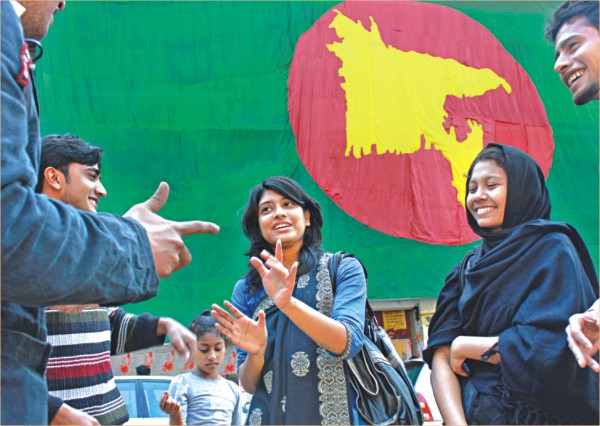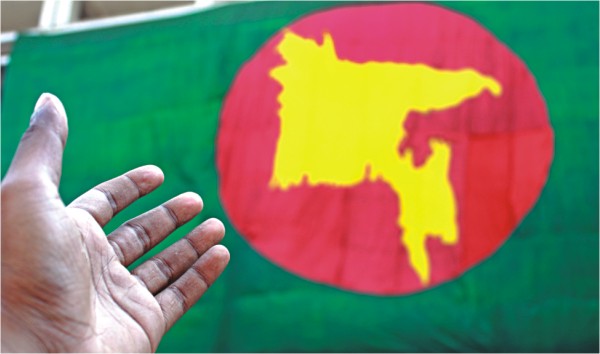
It's not them, it's us
Iresh Zaker
-------------------------------------

Prima facie, our youth is indifferent if not ambivalent towards the political situation in Bangladesh. Should you ask them point blank, most would say that they would not go within a continent of the political arena. Indeed, check out the facebook profiles of most young people, and if they have bothered to specify their political preference, it is likely to say “I hate politics.” Needless to say, this is not a desirable situation. With a tentative democracy groaning under the weight of political corruption and mediocrity, we simply cannot afford our educated youth to abandon all aspirations of one day governing the nation. Should they really do so, we should start packing our bags with due vigour. Fortunately, the situation, upon more nuanced inspection, is not as bleak.
There is no doubt that our youth is disenchanted with our current political system, and indeed they have every reason to be. An intelligent and capable young man or woman has no chance of making an honourable entry into our political arena. If they try, they will either have to sink to the general level of thuggery that is prevalent among the youth wings of our political parties, or have to make a quick and graceless exit. Furthermore, it is not like the senior forces of our political parties are presenting a rich portfolio of role models. But does this mean that our youth is not interested in being politically active? Paradoxically, my answer to that particular query will be a resounding no.
If we broaden our definition of politics from the game that AL, BNP, JP, Jamaat etal play to the actual practice of improving our society, then we will find that our youth will jump at any meaningful opportunity to engage. Strange as it may sound, a large portion of our educated youth is real politicians at heart. Just look at the zeal of 20,000 plus volunteers of Jaago Foundation and you will quickly realise that given a viable opportunity, the young people of Bangladesh will put in a mean fight for a better society. One could argue that the youth in yellow represent a minor portion of abnormally enthusiastic youngsters. The general apathy towards social and political issues among our youth would seem to lend credence to that particular point of view. My counter argument would be that we the elders, and I hate to think of myself as one but for all intents and purposes am, have simply not done a good enough job to activate the conscience and energy of the youngsters. The lack of altruistic fervor among our youth is more indicative of our failure to provide platforms where young people can believe in their own ability to initiate change. I did not just use those big words without reason beyond justifying my label as a guest contributor. Let me explain what I meant. In my experience, if you go to any upazila in Bangladesh, you will find, beyond the loafer fledgling politicos, a segment of the youth that are genuinely interested in making a difference in their own area. I cannot count the number of projects, ranging from makeshift libraries and computer laboratories to distribution of warm clothes in the winter, that I have witnessed young people execute with little encouragement or support from the elders and the political establishment of their village communities.
Moving to our cities, let us reflect on the enormous response we get from our young musicians and artists whenever we call upon them to work for or support a worthy cause. Starting from calls for freer elections to protesting violence against women, our youth will actively participate in any social movement given a modicum of opportunity. A heartening example of effective youth involvement would be the recent mayoral elections in Narayanganj. Aside from the media, the young people of the city were a force in ensuring a free and fair election.
Thus the view that our youth do not actually want to be politically active seems spurious to me. Our task now is to enable the volunteerism and activism that I believe is deeply embedded in the heart of our youth. The political culture of mainstream politics is not likely to change anytime soon. So we have to find ways by which young people in our society can effectively influence the governing process without actually donning any partisan label. Several worthy institutions such as Transparency International Bangladesh, Prothom Alo, and Ain O Shaleesh Kendra have taken steps to encourage the involvement of youth in various aspects of the government. We need to continue and enhance these efforts.
The electronic media, which, with the exception of a handful of programmes, have been largely disinterested about motivating our youth to be more socially and politically active really needs to step up in this regard. The first thing that we need is more hard-hitting and candid talk shows that involve the point of view of the youth. As of now we don't have one, and without voice it is difficult to motivate engagement.
Political and social issue programmes that target the youth are also very important. In this regard, we have once again been hobbled by the assumption that the youth is not interested in such programmes. However, unless we actually provide them with quality programming, how can we gauge their real level of interest? The overwhelming response that I got for my satirical pseudo political talk show, "Desh-E Golpo," tells me that if we present social and political issues to the youth in a way that they can relate to, a positive reception is very likely.
I suppose that the electronic media is somewhat wary about challenging the existing political order. But one of the few positives of the last ten years is the extent to which our channels have been able to rise above political persecution. In that light, the lack of political programming that target the youth represents a lack of imagination on their part more than anything else.
The one medium that, because of the protective anonymity that it provides, has been able to really activate our young people in its limited reach has been the digital and cyber space. The large number of social and political issue groups on facebook and the blogosphere tells me that our youth is seeking a voice, and will speak if they are given the slightest opportunity. Perhaps the more mainstream electronic media can take a cue from this.

I guess the larger point I want to make is this - just because we have so far failed to provide viable opportunities for our youth to engage in our political process does not mean that they are not interested in doing so. Our democracy now stands on a knife's edge. The failure of our political parties to learn from the lessons dangerously destabilised the democratic environment, perhaps to an extent that we do not fully realise. One of the most important aspects of salvaging the present scenario is to get our youth involved in social and political welfare. They have a real stake in Bangladesh being an effective political society and, given their exposure and unique viewpoint as the inheritors of our mess, may have solutions that elder factions have not thought about. It is time we gave voice and power to the real politicians of tomorrow, to the extent that we don't represent our short-sightedness and not their indifference. They want to get into politics, and for the sake of all that is good, we should help them do so.
(The writer is a marketing executive and an actor.)